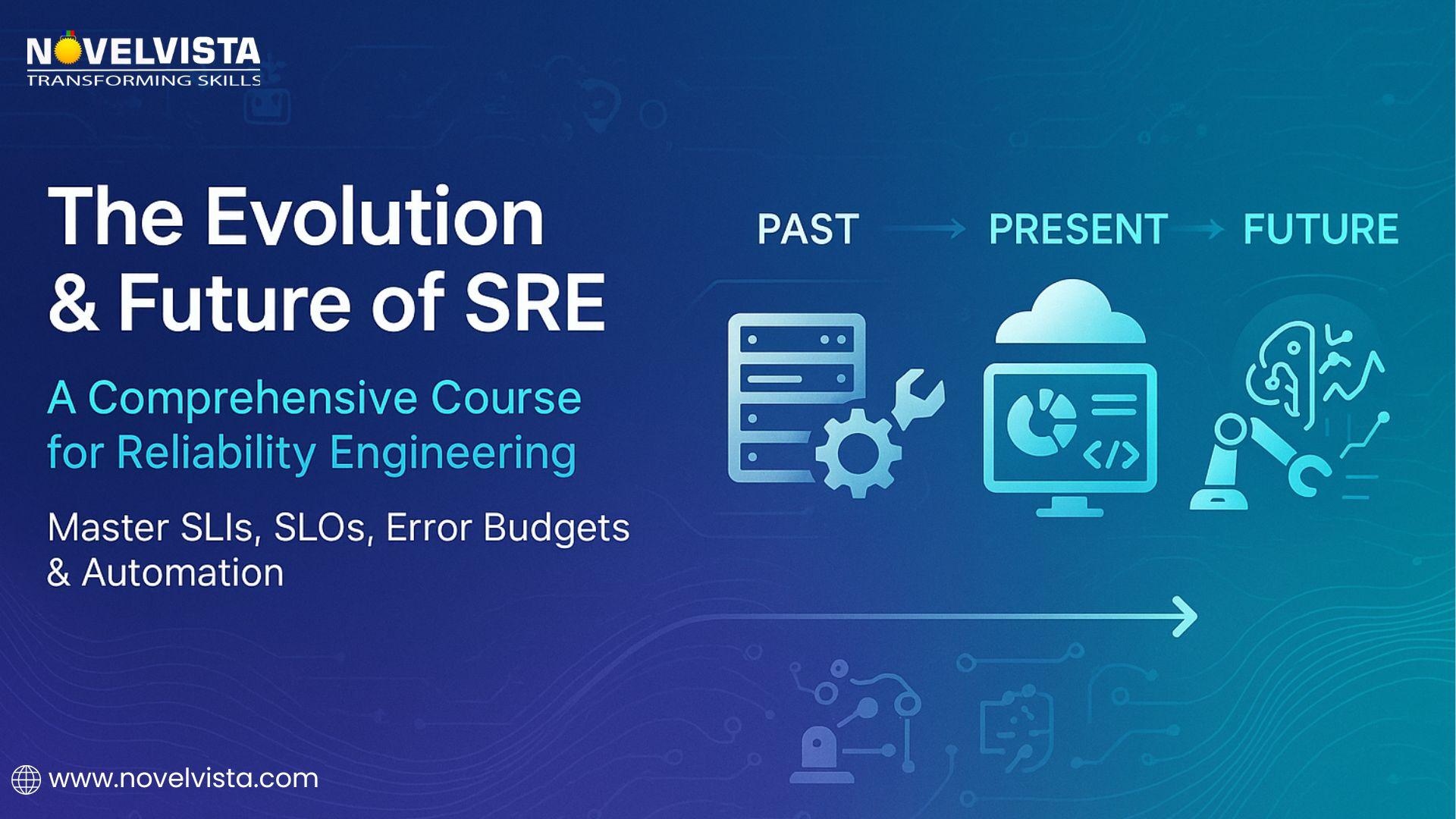A Comprehensive Course Covering the Evolution of SRE and Its Future Direction
In today’s digital world, downtime is deadly. One glitch, one service outage, and a company can lose customers, revenue, and trust instantly. This is where Site Reliability Engineering (SRE) steps in—a discipline that has redefined how organizations manage large-scale, mission-critical systems.
But how did SRE evolve from a Google experiment to a global movement? And what does its future look like in the era of cloud, AI, and microservices? A comprehensive SRE course doesn’t just answer these questions—it prepares professionals to thrive in the fast-changing reliability landscape.
From Ops to Engineering: The Birth of SRE
Back in the early 2000s, Google was running into a serious problem. Systems were growing so complex that traditional IT operations couldn’t keep up. Manual fixes, midnight firefighting, and siloed teams were slowing innovation.
Instead of throwing more people at the problem, Google took a radical approach: treat operations as a software problem. That meant automating repetitive tasks, defining measurable service goals, and engineering reliability right into the system. This philosophy became Site Reliability Engineering.
Today, SRE isn’t just a Google practice—it’s a global standard. And a strong SRE course gives learners a front-row seat to this fascinating evolution.
Inside a Modern SRE Course: What You’ll Learn
A comprehensive SRE course is designed to be practical, not just theoretical. Here’s what participants usually dive into:
SLIs, SLOs, and Error Budgets: Learn how to measure what matters, balance innovation with reliability, and manage customer expectations with confidence.
Monitoring & Incident Response: Get hands-on experience with tools and frameworks that detect failures early, trigger smart alerts, and guide effective incident management.
Automation & Toil Reduction: Replace repetitive manual work with scripts, infrastructure-as-code, and automated pipelines that scale with your business.
Blameless Postmortems: Discover how modern teams learn from failures, share knowledge openly, and improve without pointing fingers.
These modules make the course more than just an academic exercise—they prepare professionals for real-world reliability challenges.
The Future of SRE: What’s Next?
SRE isn’t standing still. As systems become more distributed and cloud-native, the discipline is evolving rapidly. A forward-looking SRE Training will help learners explore:
Cloud-Native SRE: Managing reliability across Kubernetes, containers, and microservices.
AI & ML in Reliability: Using predictive analytics and anomaly detection to spot failures before they happen.
Advanced Observability: Going beyond monitoring into full-stack visibility—logs, metrics, and traces working together.
Resilience at Scale: Designing systems that recover automatically, adapt under pressure, and evolve without disruption.
This future-focused lens ensures professionals don’t just manage today’s systems—they’re ready for tomorrow’s complexity.
Why This Course Matters
For professionals, enrolling in such a course means gaining career-defining skills. You’ll learn how to speak the language of both developers and operations teams, making you a bridge-builder in any organization.
For businesses, SRE-trained teams bring measurable results:
Faster incident resolution
Higher customer satisfaction
Reduced downtime costs
A culture of reliability and innovation
In a world where every second of uptime counts, these benefits are game-changers.
Final Thoughts
The journey of SRE certification—from Google’s labs to a global best practice—shows how powerful engineering principles can transform operations. A comprehensive course that covers both the evolution and the future direction of SRE isn’t just an educational experience. It’s an investment in building resilient systems, confident teams, and satisfied customers.
If reliability is the backbone of digital success, then mastering SRE through such a course is the smartest step forward.
In today’s digital world, downtime is deadly. One glitch, one service outage, and a company can lose customers, revenue, and trust instantly. This is where Site Reliability Engineering (SRE) steps in—a discipline that has redefined how organizations manage large-scale, mission-critical systems.
But how did SRE evolve from a Google experiment to a global movement? And what does its future look like in the era of cloud, AI, and microservices? A comprehensive SRE course doesn’t just answer these questions—it prepares professionals to thrive in the fast-changing reliability landscape.
From Ops to Engineering: The Birth of SRE
Back in the early 2000s, Google was running into a serious problem. Systems were growing so complex that traditional IT operations couldn’t keep up. Manual fixes, midnight firefighting, and siloed teams were slowing innovation.
Instead of throwing more people at the problem, Google took a radical approach: treat operations as a software problem. That meant automating repetitive tasks, defining measurable service goals, and engineering reliability right into the system. This philosophy became Site Reliability Engineering.
Today, SRE isn’t just a Google practice—it’s a global standard. And a strong SRE course gives learners a front-row seat to this fascinating evolution.
Inside a Modern SRE Course: What You’ll Learn
A comprehensive SRE course is designed to be practical, not just theoretical. Here’s what participants usually dive into:
SLIs, SLOs, and Error Budgets: Learn how to measure what matters, balance innovation with reliability, and manage customer expectations with confidence.
Monitoring & Incident Response: Get hands-on experience with tools and frameworks that detect failures early, trigger smart alerts, and guide effective incident management.
Automation & Toil Reduction: Replace repetitive manual work with scripts, infrastructure-as-code, and automated pipelines that scale with your business.
Blameless Postmortems: Discover how modern teams learn from failures, share knowledge openly, and improve without pointing fingers.
These modules make the course more than just an academic exercise—they prepare professionals for real-world reliability challenges.
The Future of SRE: What’s Next?
SRE isn’t standing still. As systems become more distributed and cloud-native, the discipline is evolving rapidly. A forward-looking SRE Training will help learners explore:
Cloud-Native SRE: Managing reliability across Kubernetes, containers, and microservices.
AI & ML in Reliability: Using predictive analytics and anomaly detection to spot failures before they happen.
Advanced Observability: Going beyond monitoring into full-stack visibility—logs, metrics, and traces working together.
Resilience at Scale: Designing systems that recover automatically, adapt under pressure, and evolve without disruption.
This future-focused lens ensures professionals don’t just manage today’s systems—they’re ready for tomorrow’s complexity.
Why This Course Matters
For professionals, enrolling in such a course means gaining career-defining skills. You’ll learn how to speak the language of both developers and operations teams, making you a bridge-builder in any organization.
For businesses, SRE-trained teams bring measurable results:
Faster incident resolution
Higher customer satisfaction
Reduced downtime costs
A culture of reliability and innovation
In a world where every second of uptime counts, these benefits are game-changers.
Final Thoughts
The journey of SRE certification—from Google’s labs to a global best practice—shows how powerful engineering principles can transform operations. A comprehensive course that covers both the evolution and the future direction of SRE isn’t just an educational experience. It’s an investment in building resilient systems, confident teams, and satisfied customers.
If reliability is the backbone of digital success, then mastering SRE through such a course is the smartest step forward.
A Comprehensive Course Covering the Evolution of SRE and Its Future Direction
In today’s digital world, downtime is deadly. One glitch, one service outage, and a company can lose customers, revenue, and trust instantly. This is where Site Reliability Engineering (SRE) steps in—a discipline that has redefined how organizations manage large-scale, mission-critical systems.
But how did SRE evolve from a Google experiment to a global movement? And what does its future look like in the era of cloud, AI, and microservices? A comprehensive SRE course doesn’t just answer these questions—it prepares professionals to thrive in the fast-changing reliability landscape.
From Ops to Engineering: The Birth of SRE
Back in the early 2000s, Google was running into a serious problem. Systems were growing so complex that traditional IT operations couldn’t keep up. Manual fixes, midnight firefighting, and siloed teams were slowing innovation.
Instead of throwing more people at the problem, Google took a radical approach: treat operations as a software problem. That meant automating repetitive tasks, defining measurable service goals, and engineering reliability right into the system. This philosophy became Site Reliability Engineering.
Today, SRE isn’t just a Google practice—it’s a global standard. And a strong SRE course gives learners a front-row seat to this fascinating evolution.
Inside a Modern SRE Course: What You’ll Learn
A comprehensive SRE course is designed to be practical, not just theoretical. Here’s what participants usually dive into:
SLIs, SLOs, and Error Budgets: Learn how to measure what matters, balance innovation with reliability, and manage customer expectations with confidence.
Monitoring & Incident Response: Get hands-on experience with tools and frameworks that detect failures early, trigger smart alerts, and guide effective incident management.
Automation & Toil Reduction: Replace repetitive manual work with scripts, infrastructure-as-code, and automated pipelines that scale with your business.
Blameless Postmortems: Discover how modern teams learn from failures, share knowledge openly, and improve without pointing fingers.
These modules make the course more than just an academic exercise—they prepare professionals for real-world reliability challenges.
The Future of SRE: What’s Next?
SRE isn’t standing still. As systems become more distributed and cloud-native, the discipline is evolving rapidly. A forward-looking SRE Training will help learners explore:
Cloud-Native SRE: Managing reliability across Kubernetes, containers, and microservices.
AI & ML in Reliability: Using predictive analytics and anomaly detection to spot failures before they happen.
Advanced Observability: Going beyond monitoring into full-stack visibility—logs, metrics, and traces working together.
Resilience at Scale: Designing systems that recover automatically, adapt under pressure, and evolve without disruption.
This future-focused lens ensures professionals don’t just manage today’s systems—they’re ready for tomorrow’s complexity.
Why This Course Matters
For professionals, enrolling in such a course means gaining career-defining skills. You’ll learn how to speak the language of both developers and operations teams, making you a bridge-builder in any organization.
For businesses, SRE-trained teams bring measurable results:
Faster incident resolution
Higher customer satisfaction
Reduced downtime costs
A culture of reliability and innovation
In a world where every second of uptime counts, these benefits are game-changers.
Final Thoughts
The journey of SRE certification—from Google’s labs to a global best practice—shows how powerful engineering principles can transform operations. A comprehensive course that covers both the evolution and the future direction of SRE isn’t just an educational experience. It’s an investment in building resilient systems, confident teams, and satisfied customers.
If reliability is the backbone of digital success, then mastering SRE through such a course is the smartest step forward.
1 Kommentare
·0 Geteilt
·108 Ansichten
·0 Bewertungen





